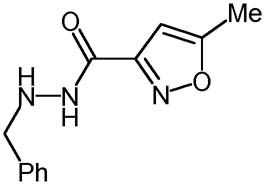| iPsychology
|
|
Isocarboxazid ( Marplan )
Isocarboxazid ( Marplan ) is used for the treatment of clinical depression. It is usually given after other medicines have failed to help. Isocarboxazid ( Marplan ) increases chemicals in the brain. The low levels of these chemicals may have caused the depression. Sleep and appetite may improve quickly. Other symptoms may take up to 4-6 weeks to improve. Isocarboxazid ( Marplan ) is superior to placebo on depression, anxiety, interpersonal sensitivity, and global measures, and on symptoms of hostility, anxiety, obsessiveness, and psychological-cognitive components of depression. There were no significant differences between treatment effects on psychomotor and typical vegetative symptoms. Isocarboxazid was more effective than placebo in major, but not in minor, depression. It was significantly more effective in depression classified as endogenous depression or melancholia by various diagnostic criteria. Isocarboxazid ( Marplan ) was more effective than placebo in atypical depression with vegetative reversal and in Brief Psychiatric Rating Scale (BPRS)-derived profiles of anxious and hostile depression.
Strengths:
Problems with:
Test:
Take With: Full Benefits In: One or six weeks. Missed Dose(s): If within one hour take, if over an hour skip and then continue on your normal schedule. If Stop Taking: Do not stop without consulting your physician and never abruptly. Overdose symptoms include: severe anxiety, confusion, convulsions, cool clammy skin, severe dizziness, severe drowsiness, fast and irregular pulse, fever, hallucinations, severe headache, high or low blood pressure, hyperactive reflexes, muscle stiffness, respiratory depression or failure, slowed reflexes, sweating, severe trouble in sleeping, and unusual irritability. Warnings Isocarboxazid should not be started until one or two weeks after a TCA or related antidepressant or SSRI or related antidepressant has been stopped ( 5 weeks for fluoxetine ). Any other antidepressant, or another MAOI, should not be started for one or two weeks after isocarboxazid has been stopped Stay away from tyramine-containing foods and drinks. Examples of foods to avoid are:
Talk with healthcare provider and nutritionist for more education. Check blood pressure regularly. Follow diet plan as recommended by healthcare provider. No tyramine-containing products. Do not take a double dose or extra doses. Do not change dose or stop taking medicine without talking with healthcare provider. Limit caffeine ( e.g., tea, coffee, cola ) and chocolate intake. Do not use over-the-counter products that may affect blood pressure. These include cough or cold remedies, diet pills, stimulants, ibuprofen or like products, and certain herbs or supplements. Talk with healthcare provider. Do not use over-the-counter medicines containing dextromethorphan ( Robitussin-DM® ) or pseudoephedrine. Can cause life-threatening high blood pressure. Do not take with other medicines for depression, diet pills, stimulants like amphetamines, reserpine, or pain medicines. There should be 2 weeks between stopping one medicine and starting another. Avoid driving, doing other tasks or activities that require you to be alert until you see how this medicine affects you. Use with this medicine may cause nervousness, shakiness, rapid heartbeats, and anxiety. Inform your Doctor if:
Isocarboxazid ( Symptoms or Effects ) Common: Blurred vision, a drop in blood pressure that occurs when going from lying down to sitting or standing which results in dizziness and lightheadedness ( postural hypotension ), drowsiness, blood disorders, muscle weakness, disturbances of the gut such as diarrhea, constipation, nausea, vomiting or abdominal pain, irregular heart beat ( arrhythmia ), problems with sexual function, dizziness, excessive fluid retention in the body tissues resulting in swelling ( oedema ), or increased appetite and weight gain. See physician always: wheezing, tightness in the chest, fever, itching, bad cough, blue skin color, fits, swelling of face, lips, tongue, or throat, confusion, very nervous, anger with sweating, shivering, stiffness, shaking, severe headache, rapid heartbeats, pounding in the chest, severe nausea, or vomiting. Interactions:
|

